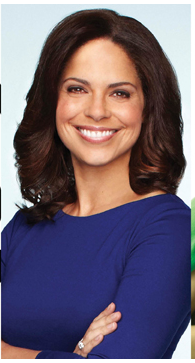O’Brien stresses telling diverse and unheard stories
November 7, 2013
Seats were filled and anticipation was high for award-winning journalist Soledad O’Brien.
O’Brien’s lecture was the second event in the Cultural Enhancement Series for this school year. She spoke at Van Meter Auditorium to a full house on Tuesday night.
Before the lecture, O’Brien answered questions and interacted with journalism students on campus.
She talked to the students about her transition from producing documentaries to reporting on the HBO show, “Real Sports.”
“The whole fun of it is jumping into a world or someone’s head that you don’t know,” she said.
O’Brien said it’s an opportunity to learn and be curious. She pointed to a recent story she did for the show about people who define themselves as e-athletes and play video games professionally.
“Where people have made a mistake of gamers is they go in with the [thought], ‘This is a waste of time,’” she said. “It’s just wrong to have that attitude with any story.”
O’Brien is well known for her In America series — Black, Latino and Gay in America. These series were made to make people talk and think, she said.
“We did coverage that people hadn’t done,” she said.
She said she got to the point where she would walk through the airport and people would come up to her wanting to be in the series.
“There were people that loved it, people that hated it,” she said.
O’Brien said she doesn’t care about criticism unless it’s constructive criticism, such as flaws in reporting or weak storytelling.
“Now that I take very seriously, and that’s crucial,” she said.
She said the most rewarding thing is to capture someone’s story very well.
“I think sometimes in news it tells — this person is bad this, person is good,” she said. “And really we’re really this mix of a charming, terrible person.”
O’Brien said that’s what she likes about documentaries — showing someone’s true colors.
She said she’s always intrigued to see the stories that come out of the nation’s “very troubled past.”
“Diversity in storytelling is so important,” she said. “To tell the story of America, all the voices have to be heard.”
O’Brien said her parents framed how she thinks about journalism and that they’re the reason she’s so interested in telling stories that would otherwise go unheard.
Her mother, who is black and Cuban, and her father, who is Australian, were together in the late 1950s when interracial dating was frowned upon.
“I would ask my mother what it was like to walk around Baltimore in the late 1950s, early 1960s,” she said. “She said, ‘Oh, people used to spit on us thinking we were disgusting.’”
O’Brien asked her mother what she did when that happened.
Her mother responded with, “We knew America was better than that.”
O’Brien said she believes things can change because the hope and idea of America is better than that.
As a journalist, she said she wants to tell stories about people that are different than the stereotypes.
David Lee, dean of Potter College of Arts and Letters, said he thought the lecture was well done, lively and challenging.
“There was a great response from the audience,” he said.
St. Louis senior Karlos Harbor said he thought O’Brien had great points.
“I especially like the part where she talked about redefining yourself,” he said. “It really hit me as a black guy at a predominately white institution.”
Harbor said he was inspired to get out of his comfort zone and get to know people that aren’t like him.
Winchester junior Kinya Embry said O’Brien inspired her.
“It made me want to use my voice and spread diversity,” she said. “And it made me ask myself, ‘Am I doing everything to my full potential?’”
























